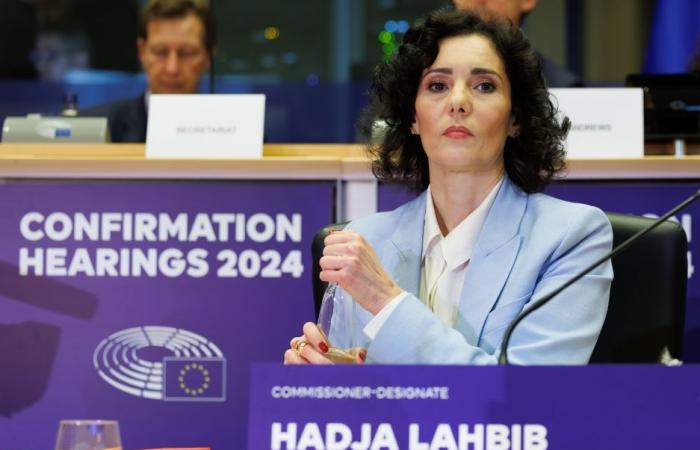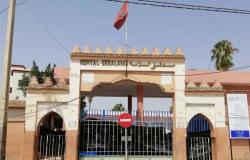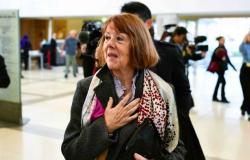
In her presentation, the candidate prioritized the equality portfolio, committing in particular to fully implementing the Istanbul Convention on preventing and combating violence against women and domestic violence. .
Roadmap for human rights, new post-2025 gender equality strategy, review of the strategy for equality for LGBTIQ people, new anti-racism strategy, new measures in favor of people with disabilities, strategic framework for Roma communities, protection against cyber-harassment: Hadaj Lahbib is committed to all these points, without however going into the detail of the planned measures.
As for crises and their management, the candidate confirmed the need to better prepare the Union. “We can no longer simply react to crises, we must better anticipate and prevent through a strategy of support for Member States, which I will present at the start of my mandate”. Hadja Lahbib also insisted on the need to involve the whole of society and citizens to build a “culture” shared crisis preparedness, a point that Ursula von der Leyen had already insisted on.
Floods in Spain: “We must prepare better”
The candidate focused on the situation in Spain, hit by deadly floods. “This is terrible proof that we need to prepare better. So I will strengthen our climate resilience and contribute to our climate adaptation plan”. Preparing for health crises and chemical, biological or nuclear threats were also discussed.
As for humanitarian aid, the head of Belgian diplomacy underlined the importance of involving more donors around the world and encouraging Member States to achieve the objective of 0.7% of the gross national product. Without directly citing UNRWA, the United Nations agency for Palestinian refugees, supported by the EU but targeted by Israel, she repeated support for the UN and recalled the principles of not targeting civilian populations, schools and hospitals.
Applauded at the end of her introduction, the candidate continued with questions from MEPs, to which she answered this time in French.
Asked about women’s rights and the fight for equality
From the first question, the “free choice” of women to dispose of their bodies and to decide whether or not to have children was highlighted by Hadja Lahbib. Asked about the decline in fertility in Europe, she focused on the support needed to enable women to give birth. “without fear of losing their career”For example.
The next few months will be dedicated to establishing an overview of the “social reality” thanks to data from bodies like the EU Fundamental Rights Agency, with the aim of “put everything in place to be able to properly support women in their choice”.
Asked about the right to voluntary termination of pregnancy (abortion), Ms. Lahbib referred to the European Court of Human Rights, “who estimated in 2023 that the lack of safe and secure access to abortion is an attack on individual rights (…) It is a basis on which we can build”. An affirmation followed by applause.
While women’s bodies “divides societies”sexual and reproductive rights are “basic rights that absolutely must be protected”she insisted, regretting the decline observed in certain European countries. Hadja Lahbib also announced a roadmap on the gender equality strategy for March 8. She is committed to being attentive to the financing of this theme. The minister remained cautious about the recent failure of the EU to come up with a common definition of rape, based on consent.
Several MEPs wondered whether the coupling of the equality portfolio with that of crisis management did not constitute a step backwards. Hadja Lahbib stressed that the forces of her predecessor Helena Dalli (outgoing Equality Commissioner, Editor’s note) remained in place. The idea is to integrate the theme of equality into all police stations in a transversal manner using a task force, she explained. “For me, there will be 26 commissioners who will have to answer for equality during this mandate.”
The far right has attacked surrogacy. The candidate avoided the trap. “It is a competence of the Member States”she replied. However, she raised a European angle: differences in legislation in the EU lead to more inequalities in the recognition of children between Member States, it is also a question of freedom of movement of people. Hadja Lahbib supported the idea of a European certificate of recognition for these children, “no matter their parents”she said, garnering applause. This was also the case when she spoke out against conversion therapy.
Hadja Lahbib responds to attacks on Iranian visas and her trip to Crimea
Belgian Foreign Minister Hadja Lahbib responded to repeated questions from certain MEPs who questioned her, during her confirmation hearing as European Commissioner, on two hot issues which jeopardized her mandate: the issuance of visas in 2023 to an Iranian delegation and a journalistic report in 2021 in Russian-occupied Crimea.
These questions came in particular from N-VA MEP Assita Kanko (ECR), from the far right (German AfD) or even from members of the EPP who voted against Ursula von der Leyen in July, like the French François-Xavier Bellamy (The Republicans). The designated commissioner repeated the answers she had already given before the Chamber on these two files. She notably recalled that the issuing of visas to the Iranian delegation had been done against the advice of her ministry, and that she herself had obtained the confidence of the Chamber.
As for the controversy over her reporting in Crimea, where she had entered via Russia, she refuted the allegations of an AfD elected official claiming that the invitation came “Putin’s daughter”and questioning his support for Ukraine. “This invitation came from an artist who lived in Belgium”she replied. “There can be no doubt that I, as Foreign Minister, have always defended Ukraine’s sovereignty over Crimea”said Hadja Lahbib, emphasizing his proximity to Ukrainian President Volodymyr Zelensky, as well as Belgium’s armed and financial support for kyiv.
On the competence of humanitarian aid, far-right elected officials attacked the candidate over Belgian and European support for UNRWA, the UN agency for Palestinian refugees, whose agents Israel accuses of supporting the terrorism. The minister repeated the EU position: if there is no zero risk, there is zero tolerance; extremely strict controls are carried out and the EU continues to support the UN.
Questioned for the umpteenth time about Crimea, the minister, however, made a mistake by responding on the Iranian issue. To pass without problems, Hadja Lahbib needs the support of the coordinators of political groups representing two thirds of the committees involved. The support of ECR is therefore also necessary, in addition to the EPP, the S&D, Renew and the Greens/ALE. Additional written questions, or even a new hearing, are theoretically possible if the account is not there. In the end, a simple majority vote could take place.





